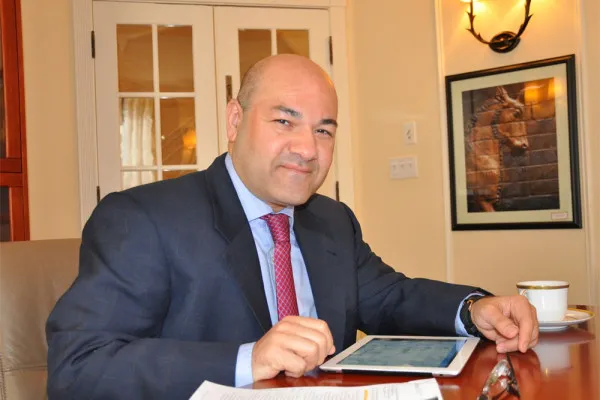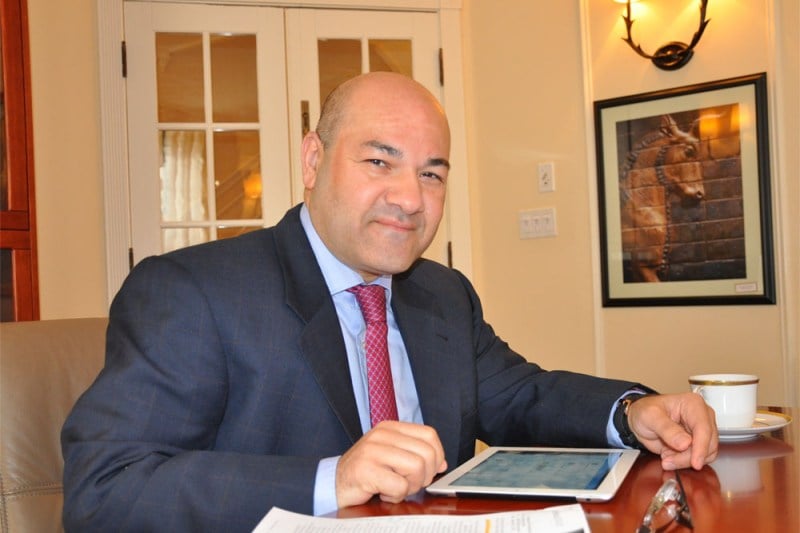
His Excellency Lukman Faily, Ambassador of The Republic of Iraq to the United States, visited Stanford on Monday in advance of attending a conference at the Hoover Institution related to the modern history of Iraq.
The conference, entitled “Totalitarianism in Saddam’s Iraq: Documents as a Window to a Dictatorship,” is centered around a set of documents housed at the Hoover Institution that were originally taken from the Headquarters of the Ba’ath Party in Baghdad in 2003. Faily will deliver the conference’s keynote address. The conference will also feature talks and discussions with some of Stanford’s resident experts on Iraqi affairs and United States relations to the Middle East. The Honorable Raid Juhi, the former Iraq National Tribunal judge, will also speak at the conference.
The Daily sat down with Ambassador Faily on Monday to discuss the conference and the Iraqi Embassy’s relationship with Stanford.
The Stanford Daily (TSD): Is this your first trip to Stanford?
Lukman Faily (LF): This is my second trip to Stanford — [on] previous trips I had meetings with key people who were involved in Iraq, such as Dr. Condoleezza Rice, Secretary Perry and a few others as well, some of the researchers and so on. In addition to that, just to get an understanding of the archives of the documentation of the Ba’ath Party that the Hoover Institution holds and is processing, with digitalization and so on.
This conference is going to talk about what took place and how we can cooperate with each other, and to give them an Iraqi perspective on what was going on
TSD: So these are the only copies of these documents available in the world today?
LF: They are the only copies — they are actual live documents captured at the head office of the Ba’ath Party in Baghdad in 2003, and were brought here to be understood, archived, digitalized, and to gain a better understanding how the Ba’ath Party operated.
TSD: What is the focus of the conference at the Hoover Institution Tuesday?
LF: It is primarily to talk about what took place, what are the areas for cooperation and to explore the actual history of Iraq in relation to the totalitarian regimes. The documents themselves provide a sample, a good sample, of how systematic the oppression and ruthlessness of Saddam [Hussein]’s rule was. I want to get a feel of people who are interested in Iraq, and I am also interested in coming to Silicon Valley and having discussions with major companies, for example, how Google could work with Iraq, how Qualcomm could, and others as well.
TSD: What is your opinion of the Hoover Institution in comparison to other think tanks in D.C.?
LF: We know that you have a very good archival process, and a good historical understanding of that dealing with the Cold War and other things. We also know that you have a good research base, which adds to that. You also have a good archive library. In addition to people, you have the rich raw material as well. In that sense, plus being a University, it brings more impartiality and more objectivity
TSD: Do you see yourself and the Iraqi embassy having a continued relationship with Stanford in the future?
LF: This is an objective of our trip, to get a better understanding of this. Earlier today, we had a meeting with Secretary Shultz to just to get his perspective on what the University can offer, and we will have other discussions. Later on today, I will have one with the library, to see what areas of cooperation exist now and how we could get a better understanding of what is taking place now, as well as future cooperation.
Iraq does need partnership with those who are with expertise, and have a better understanding of what took place. Americans, for less than 10 years now, have a good understanding of the ruthlessness of Saddam Hussein, change has taken place, democracy is in place, how do we archive that, how do we learn from it and how do we disseminate it across research and academia as to what took place. This is a small project, though it has two million documents. It is comparatively small compared to the archives in Iraq, but it provides a good acid test.
TSD: Is the conference you are attending Tuesday an extension of what you were on campus about in February?
LF: The February one was just about the discovery mode — now we are in the planning and action mode. When I come to San Francisco, I usually like to see not just the big issue, but the other issues as well.
TSD: Given your technical background, how has your experience been at Stanford so far?
LF: I wish I was a student here [laughs]. I graduated from Manchester in the United Kingdom. The capabilities of the University, what it can provide, and the desire for knowledge to think out of the box and providing for students’ needs and create the environment [the University] would need to mentor students, is a great one. I understand that there is a lot of cooperation with Silicon Valley, which is a clear added value.
TSD: Any final remarks?
LF: Those who suffered under Saddam Hussein appreciate the opportunity for change. Also, the regime was unsustainable for us to carry on with. We realize that change was necessary, and we appreciate the United States for that.
Contact Nitish Kulkarni at nitishk2 ‘at’ Stanford ‘dot’ edu.
